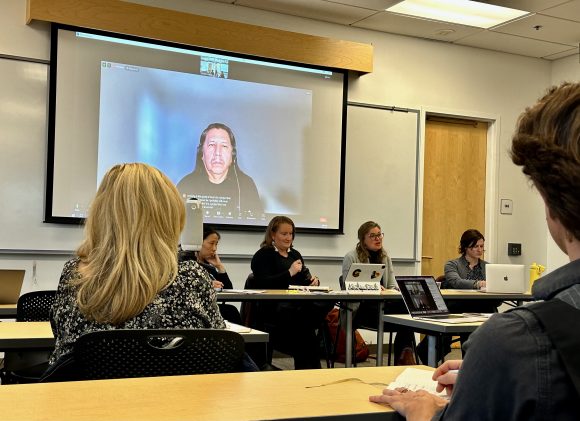
Panelists at the Climate Justice at Home and Beyond: Research, Policy & Action event on Dec. 4, 2023. (Lucy Adlen/ CU Independent).
On Dec. 4, the Environment and Society Program at the University of Colorado Boulder hosted the final Climate Justice Series Talk of the year, “Climate Justice at Home and Beyond: Research, Policy & Action.”
The panel featured five speakers who discussed cutting across boundaries to find where climate change prioritization fits in academia and teaching.
Senior Associate Vice Chancellor for CU, Jon Leslie, spoke first and acknowledged the university’s long legacy of climate leadership, both on student and faculty levels. However, he also expressed the urgency of climate change research at CU Boulder and the importance of reprioritizing the climate in the present day.
“We’ve fallen off from that leadership position,” Leslie said. “We need to take a hard look at ourselves to do a better job of not only meeting previously stated goals but accelerating them and improving campus engagement from a very earnest perspective.”
The conversation explored many aspects of climate justice, such as the ethical importance of research and data, the cultivation of relationships with tribal nations, systemic inequities and political barriers.
Amanda Carrico, associate professor and environmental studies department chair, stressed the importance of data when talking about climate justice. She emphasized that data, especially the use of data collection mechanisms, needs to be done through a justice framework.
Human-environment geographer and researcher at CU Boulder, Katie Clifford, discussed how her unique position allowed for a focus on fostering relationships with frontline communities for climate research, those that climate change affects. the most.
Clifford stressed the importance of knowing when to stop research pursuits.
“If your work is not going to positively affect a community at work, there could be ethical complications,” Clifford said. “We need to have a better process for stopping, particularly with tribal communities and communities of color are disproportionately impacted communities.”
Developing relationships and discussions with tribal nations has to be a priority when addressing climate justice, according to Tribal engagement specialist, James Rattling Leaf Sr., who stated that there need to be efforts to continue to elevate the voices of tribal communities in all areas, especially when it comes to policy-making.
“I do believe that CU can be positioned to work more effectively with tribal nations,” Rattling Leaf said. “I get the opportunity, as with many others at the university, to be that interface between the university, academia, research, policy and tribal nations.”
Panelist Emily Yeh, a CU Boulder professor of geology, spent much of her time speaking about the current barriers to climate change justice. She expressed how hard it is to find ways for climate change to be taken seriously in all disciplines.
She referred to the United Nations Climate Change Conference (COP28) and discussions held at CU Boulder concerning tangible steps that can be taken to mitigate climate change. According to Yeh, these issues are highly political on every level, especially when it comes to small procedural injustices.
The boundaries that can be posed by politics were also discussed by panelist Emma Pinter, currently serving as Adams County District Commissioner.
The value of data in bringing the details of climate justice to light was echoed by Pinter.
Pinter voiced the dire need to utilize climate research to create change. High-risk scores for health outcomes and access to care were identified in Southeastern Colorado areas, with a particular focus on Adams County. Pinter pointed to orphaned wells in her county, which pose health risks for the residents of Adams County.
Each speaker’s points emphasized the overall verdict throughout the two hours: climate change is here and ethical climate justice needs to be a priority in academia.
The panel ended with questions and comments from the audience, to which the broad consensus was that there are boundaries that need to be thought across moving forward, especially from the CU Boulder campus while teaching and conducting academic research.
“I think there’s a tendency to push scholars into the position of advocacy,” Carrico said. “I think we have to be very careful, intentional and cautious.”
Contact CU Independent Special Issues Editor Lucy Adlen at lucy.adlen@colorado.edu.
